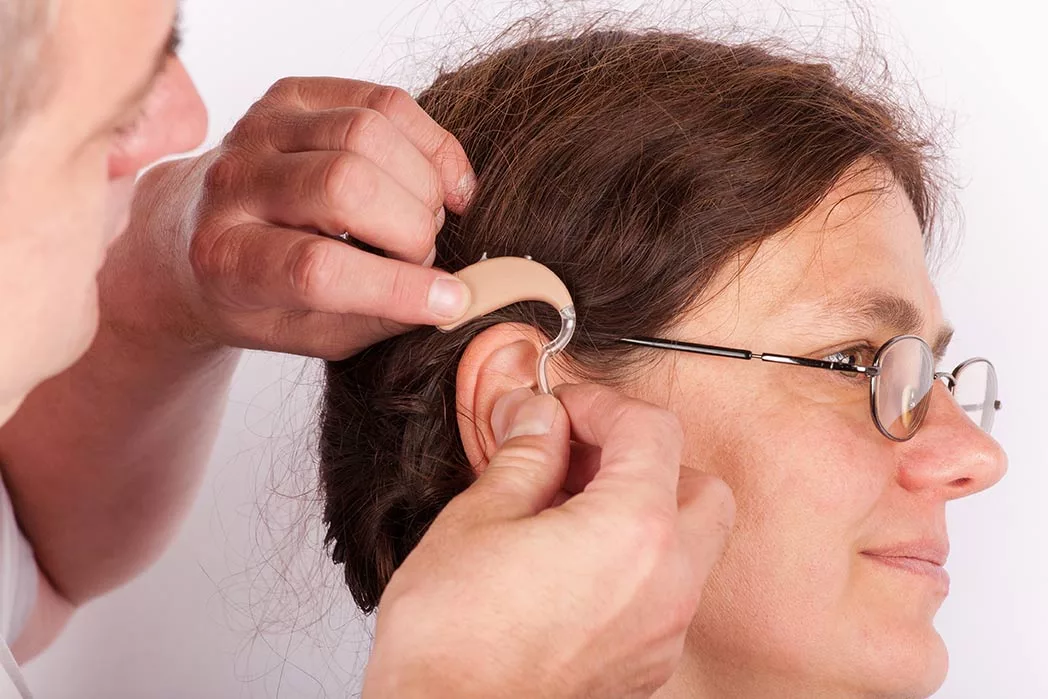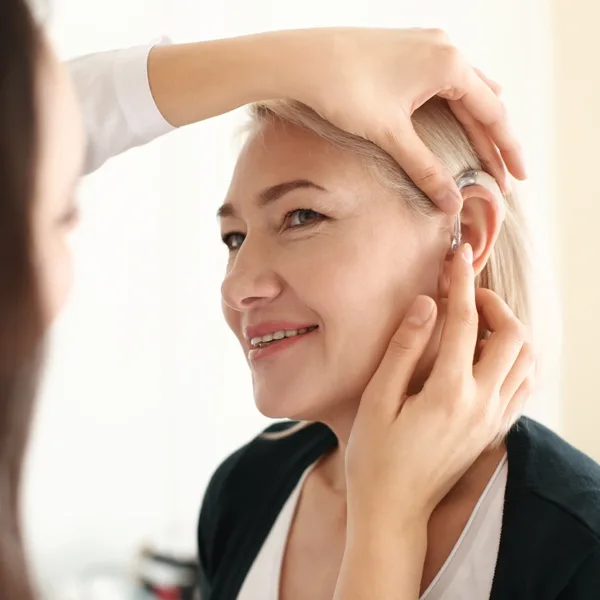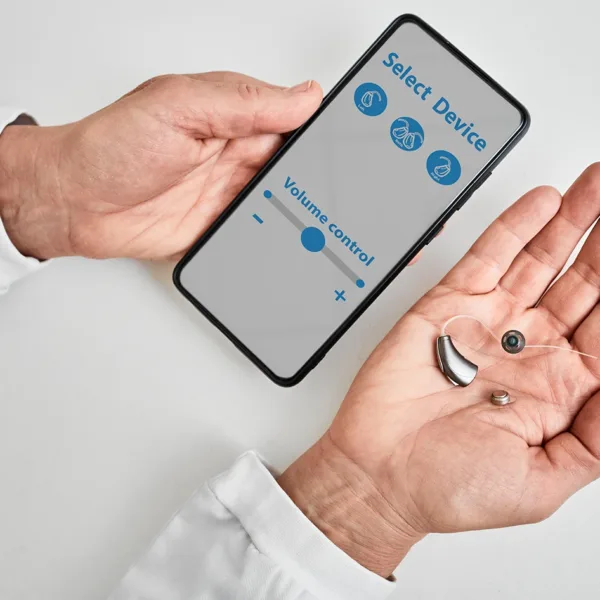
In October of 2022, the Federal Drug Administration (FDA) approved the use of over-the-counter (OTC) hearing aids. This ruling was initiated to increase access to, and adoption of, hearing aids. However, before you reach for a pair of “drugstore” hearing aids, it’s important to understand the differences between OTC hearing aids vs prescription hearing aids.
In this article, we provide a comprehensive overview of OTC devices compared to prescription hearing aids to help you make informed decisions regarding your hearing health.
What Are Over-the-Counter Hearing Aids?
OTC hearing aids, as the name implies, do not require a prescription to purchase them. Like over-the-counter medications, anyone may purchase OTC hearing aids at a drugstore, pharmacy, variety store, or online retailer without a prescription or audiology exam. These types of hearing aids are primarily sound amplifying devices, and are only designed to treat self-perceived mild to moderate hearing loss for adults 18 years of age and older.
What Are Prescription Hearing Aids?
Prescription hearing aids require an audiometric exam and prescription from a trained, licensed hearing healthcare provider, and are purchased through a licensed hearing aid provider. Prescription hearing aids are designed to treat any level of hearing loss, from mild to profound, in both children and adults.
Key Differences Between OTC vs Prescription Hearing Aids
Think of it this way: Just like how drugstore reading glasses can help you read a little better in certain situations, nonprescription hearing aids are designed to help you hear better in certain situations as well. However, it’s important to remember that, just like drugstore readers, OTC hearing aids might not be the best option for everyone or provide the best solution for many hearing issues.
Let’s take a closer look at the differences between over-the-counter hearing devices and prescription hearing aids, so you can make an informed decision and pick the best solution for your needs.
Hearing Tests
A hearing aid prescription will be tailored to your specific needs based on a thorough examination provided by a hearing health professional. They’ll do a physical examination of your ear and other auditory tests to determine the cause and extent of your hearing loss. Since OTC hearing aids do not require a hearing test to purchase them, users may rely on online hearing tests, a smartphone app provided by the manufacturer, or none at all.
Hearing loss has different causes, and an online hearing test cannot give a complete picture or a comprehensive diagnosis. For example, if your hearing loss was caused by a build up of ear wax blocking your ear canal (cerumen impaction), it could be easily remedied by a medical professional. In this instance, a hearing aid wouldn’t be necessary at all.
Similarly, without a physical exam and more extensive tests conducted by an audiology professional, choosing the best hearing aid for your needs could be problematic. You could end up with a device that doesn’t fit correctly, isn’t adjusted properly, or is unable to even treat your level of loss. On the other hand, when working with an hearing healthcare provider, your hearing device will be professionally fitted, adjusted, and prescribed specifically for your needs.
Hearing Solutions
When it comes to taking control of your hearing health, understanding the limitations and benefits of each type of hearing device is especially important. For instance, while OTC hearing aids can help with mild to moderate loss, they are not designed to treat severe or profound hearing loss and are only approved for use by adults (18+).
There are a number of different styles of hearing aids available, such as behind the ear (BTE), over-the-ear (OTE), in-the-canal (ITC), and completely-in-the-canal (CIC). Choosing the best one for you can depend on a number of things, including how severe your level of hearing loss is, and even the size and shape of your ears.
A hearing healthcare provider will help you to understand which types of hearing aids are best for you. They will also help you make a selection within the requirements for your hearing prescription, type of loss, and lifestyle. You will be able to ask questions in real time, knowing you’re dealing directly with the expert, versus an online chatbot or customer service person reading from a script.
Hearing Technology
Advances in hearing aid technology have greatly enhanced the benefits of hearing devices to provide people with more adaptable and personalized hearing solutions than ever before. When combined with smartphone technology, today’s hearing aids can assist with a number of daily tasks and activities. However, most OTC devices have limited capabilities, and only help with amplifying sounds.
You can obtain prescription hearing aids with advanced features that are personalized for your needs from a hearing healthcare professional. These are some of the things you can do with prescription hearing aids equipped with the latest in hearing aid technology:
- Hear your smart TV directly in your hearing aids (with wireless technology)
- Hear videos and calls on your smartphone, directly in your hearing aids
- Adjust noise-filtering for crowded or loud environments
- Adjust directional controls to block out ambient noise
- Use health monitoring and activity tracking
- Hear, speak, take and end calls, completely hands-free for Apple smartphone calls
- Wear hearing aids that amplify only the tones you’re having trouble hearing
Hearing Aid Fittings

Hearing aids are a game changer that trades all those missed words, half-heard names, and muddy music, for clarity, understanding, and beauty. But only if they’re worn. Often times patients who experience discomfort or trouble keeping the devices in their ears, lose heart and give up on this life-changing solution.
OTC hearing aids are self-fitted, and in most cases, you may not be able to try them on before you buy them, or return them after purchase. You may have tried purchasing shoes online and found that they don’t fit properly. Like our feet, our ears come in many shapes and sizes. Imagine purchasing hearing aids without someone to make sure you get the proper fit. The FDA does not require manufacturers to accept returns of their devices, but they do require that the return policy be stated on the packaging. So, it’s important to scrutinize the printed policy carefully, as they will vary.
Unlike OTC hearing aids however, your prescription hearing aid will be secure and comfortable because they will be fitted by a hearing health professional. Plus, if you find that, after a few days of wearing them, you notice discomfort or other issues with wearability, you can bring the devices back to the clinic for adjustment or replacement. In this scenario, you’re working with a clinic’s return policy, not varying, individual, manufacturer return policies.
On-going Hearing Heath Care
Hearing health does not, and should not stop with hearing aids. Maintaining hearing health begins with prevention and continues with regular visits to an hearing healthcare provider to ensure that your hearing has not changed. Bypassing the crucial monitoring of hearing health with OTC hearing aids may put your hearing health at risk.
When choosing prescription hearing aids, you’re also choosing to have an ear health team to help you hear well today, and continue to monitor your hearing health into the future.
Pricing
Finding a hearing solution that perfectly meets your needs and budget, without the help of hearing professionals, will be challenging at best. There’s no denying that the initial cost of OTC hearing aids is much lower. However, when you factor in all that you’re losing, that price tag may not look so enticing.
In order to save money (up front) on OTC hearing aids, you sacrifice:
- Hearing health assessment
- Customized hearing solutions
- Professional calibration to your specific loss
- Professional fittings and adjustments
- Access to a hearing professional
- Easy returns or replacements
- Professional cleaning of your instruments and ear canals
- Recurring adjustments to your aids as your hearing may change
With only literature and sales people to guide you, the process of finding the right hearing aids for your needs can be frustrating, and, ultimately, more expensive. Especially if you’re having to go through several devices, looking for the correct solution.
If price remains an issue, there are a number of ways to save on prescription hearing aids, including:
- Health Insurance (depending on provider and plan)
- Healthcare financing, such as Wells Fargo Health or CareCredit
- Payment plans (ask your hearing healthcare provider)
- Health Savings Account
- Flexible Savings Account
Before deciding you can’t afford prescription hearing aids, talk to an hearing healthcare clinic near you about pricing and payment options. Also, know that, when it comes to preserving your hearing to better engage with life, it’s worth the investment.
Get the Personalized Care You Deserve by Finding a Hearing Clinic Near You
Making informed decisions regarding your hearing health is an essential part of maintaining your quality of life. OTC devices do have a number of limitations, but they may be an accessible solution for people with self-perceived mild to moderate hearing loss. For people, with severe hearing loss or specific hearing needs, prescription hearing aids provide a more personalized and advanced treatment solution. Ultimately, the choice between OTC vs prescription hearing aids will depend on your individual hearing loss, lifestyle, and budget.
At Audibel, your hearing health is our primary concern. You’re not a customer. You are a patient. You’re a patient who needs and deserves the very best, expert hearing healthcare. We encourage you to take the first step to finding the personalized hearing health care you deserve by meeting with one of our highly experienced hearing healthcare providers at any of hearing clinics conveniently located throughout the United States. Take control of your hearing health today and maintain a healthy quality of life for years to come.







Have a question or Comment?